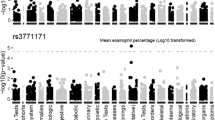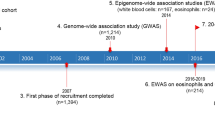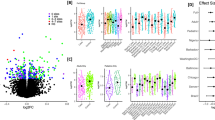Abstract
The interpatient variability in response to asthma controllers is significant and associates with pharmacogenomic variability. The goal of the present study was to identify novel variants that associate with response to common asthma controllers: fluticasone, combination of fluticasone + salmeterol and montelukast with single nucleotide polymorphisms (SNPs) in β2-adrenergic receptor, corticosteroid and leukotriene pathway candidate genes. Participants in a large clinical trial of step-down strategies volunteered for this pharmacogenetic study. A total of 169 SNPs in 26 candidate genes were genotyped in 189 Caucasian participants with asthma who took either fluticasone (100 μg bid), fluticasone propionate (100 μg) + salmeterol (50 μg) (FP/Salm) or montelukast (5 or 10 mg) each night for 16 weeks. Primary outcomes were the slopes of plots of Asthma Control Questionnaire (ACQ) scores versus time following randomization; and the percent change in percent predicted FEV1 (ΔFEV1%pred) from enrollment to the end of the study. Associations between SNPs and outcomes were analyzed using general linear models. False discovery rate and Bonferroni corrections were used to correct for multiple comparisons. In all, 16 SNPs in seven genes were significantly associated with outcomes. For FP/Salm, three SNPs in CHRM2 associated with ACQ slope (P=2.8 × 10−5), and rs1461496 in HSPA8 associated with ΔFEV1%pred. For fluticasone, five SNPs in CRHR1 (P=1.9 × 10−4), and three SNPs in COL2A1 associated with ACQ slope and ΔFEV1%pred, respectively. For montelukast, four SNPs in CHRM2 associated with ΔFEV1%pred and predicted an opposite effect compared with fluticasone (P=9 × 10−3). The present study indentified several novel SNPs that associate with response to common asthma controllers, and support further pharmacogenomic study and the use of genetic variants to personalize asthma treatment.
This is a preview of subscription content, access via your institution
Access options
Subscribe to this journal
Receive 6 print issues and online access
$259.00 per year
only $43.17 per issue
Buy this article
- Purchase on SpringerLink
- Instant access to full article PDF
Prices may be subject to local taxes which are calculated during checkout







Similar content being viewed by others
References
Akinbami LJ, Moorman JE, Liu X . Asthma prevalence, health care use, and mortality: United States, 2005-2009. Natl Health Stat Report 2011; 32: 1–14.
Lima JJ . Genetic influences on response to asthma pharmacotherapy. Expert Rev Clin Pharmacol 2008; 1: 649–660.
Lima JJ . Treatment heterogeneity in asthma: genetics of response to leukotriene modifiers. Mol Diagn Ther 2007; 11: 97–104.
Lima JJ, Blake KV, Tantisira KG, Weiss ST . Pharmacogenetics of asthma. Curr Opin Pulm Med 2009; 15: 57–62.
Drazen JM, Silverman EK, Lee TH . Heterogeneity of therapeutic responses in asthma. Br Med Bull 2000; 56: 1054–1070.
Wu AC, Tantisira K, Li L, Schuemann B, Weiss S . Repeatability of response to asthma medications. J Allergy Clin Immunol 2009; 123: 385–390.
Tantisira KG, Hwang ES, Raby BA, Silverman ES, Lake SL, Richter BG et al. TBX21: a functional variant predicts improvement in asthma with the use of inhaled corticosteroids. Proc Natl Acad Sci USA 2004; 101: 18099–18104.
Tantisira KG, Lake S, Silverman ES, Palmer LJ, Lazarus R, Silverman EK et al. Corticosteroid pharmacogenetics: association of sequence variants in CRHR1 with improved lung function in asthmatics treated with inhaled corticosteroids. Hum Mol Genet 2004; 13: 1353–1359.
Wechsler ME, Israel E . beta-adrenergic receptor genotype and response to salmeterol. J Allergy Clin Immunol 2007; 120: 218–219.
Wechsler ME, Lehman E, Lazarus SC, Lemanske Jr RF, Boushey HA, Deykin A et al. beta-Adrenergic receptor polymorphisms and response to salmeterol. Am J Respir Crit Care Med 2006; 173: 519–526.
Klotsman M, York TP, Pillai SG, Vargas-Irwin C, Sharma SS, van den Oord EJ et al. Pharmacogenetics of the 5-lipoxygenase biosynthetic pathway and variable clinical response to montelukast. Pharmacogenet Genomics 2007; 17: 189–196.
Lima JJ, Zhang S, Grant A, Shao L, Tantisira KG, Allayee H et al. Influence of leukotriene pathway polymorphisms on response to montelukast in asthma. Am J Respir Crit Care Med 2006; 173: 379–385.
Telleria JJ, Blanco-Quiros A, Varillas D, Armentia A, Fernandez-Carvajal I, Jesus Alonso M et al. ALOX5 promoter genotype and response to montelukast in moderate persistent asthma. Respir Med 2008; 102: 857–861.
American Lung Association Asthma Clinical Research Centers, Peters SP, Anthonisen N, Castro M, Holbrook JT, Irvin CG, Smith LJ et al. Randomized comparison of strategies for reducing treatment in mild persistent asthma. N Engl J Med 2007; 356: 2027–2039.
American Lung Association Asthma Clinical Research Centers. Clinical trial of low-dose theophylline and montelukast in patients with poorly controlled asthma. Am J Respir Crit Care Med 2007; 175: 235–242.
Juniper EF, O'Byrne PM, Guyatt GH, Ferrie PJ, King DR . Development and validation of a questionnaire to measure asthma control. Eur Respir J 1999; 14: 902–907.
Hankinson JL, Odencrantz JR, Fedan KB . Spirometric reference values from a sample of the general US population. Am J Respir Crit Care Med 1999; 159: 179–187.
Guo SW, Thompson EA . Performing the exact test of Hardy-Weinberg proportion for multiple alleles. Biometrics 1992; 48: 361–372.
Barrett JC . Haploview: Visualization and analysis of SNP genotype data. Cold Spring Harb Protoc 2009.
Johnson AD, Handsaker RE, Pulit SL, Nizzari MM, O'Donnell CJ, de Bakker PI . SNAP: a web-based tool for identification and annotation of proxy SNPs using HapMap. Bioinformatics 2008; 24: 2938–2939.
Rao PV . Statistical Research Methods in the Life Sciences. Duxbury Press: Pacific Grove, CA, 1998.
Storey JD . A Direct Approach to False Discovery Rates. J R Stat Soc Series B Stat Methodol 2002; 64: 479–498.
Storey JD, Tibshirani R . Statistical significance for genomewide studies. Proc Natl Acad Sci USA 2003; 100: 9440–9445.
Team RDC . R: A Language and Environment for Statistical Computing. R Foundation for Statistical Computing: Vienna, Austria, 2010.
Tantisira KG, Lazarus R, Litonjua AA, Klanderman B, Weiss ST . Chromosome 17: association of a large inversion polymorphism with corticosteroid response in asthma. Pharmacogenet Genomics 2008; 18: 733–737.
Coulson FR, Fryer AD . Muscarinic acetylcholine receptors and airway diseases. Pharmacol Ther 2003; 98: 59–69.
Eglen RM, Hegde SS, Watson N . Muscarinic receptor subtypes and smooth muscle function. Pharmacol Rev 1996; 48: 531–565.
Mak JC, Barnes PJ . Autoradiographic visualization of muscarinic receptor subtypes in human and guinea pig lung. Am Rev Respir Dis 1990; 141: 1559–1568.
McGraw DW, Forbes SL, Kramer LA, Witte DP, Fortner CN, Paul RJ et al. Transgenic overexpression of beta(2)-adrenergic receptors in airway smooth muscle alters myocyte function and ablates bronchial hyperreactivity. J Biol Chem 1999; 274: 32241–32247.
Baker DG, Don HF, Brown JK . Direct measurement of acetylcholine release in guinea pig trachea. Am J Physiol 1992; 263: L142–L147.
Patel HJ, Barnes PJ, Takahashi T, Tadjkarimi S, Yacoub MH, Belvisi MG . Evidence for prejunctional muscarinic autoreceptors in human and guinea pig trachea. Am J Respir Crit Care Med 1995; 152: 872–878.
Ayala LE, Ahmed T . Is there loss of protective muscarinic receptor mechanism in asthma? Chest 1989; 96: 1285–1291.
Minette PA, Barnes PJ . Prejunctional inhibitory muscarinic receptors on cholinergic nerves in human and guinea pig airways. J Appl Physiol 1988; 64: 2532–2537.
Fernandes LB, Fryer AD, Hirshman CA . M2 muscarinic receptors inhibit isoproterenol-induced relaxation of canine airway smooth muscle. J Pharmacol Exp Ther 1992; 262: 119–126.
Kume H, Kotlikoff MI . Muscarinic inhibition of single KCa channels in smooth muscle cells by a pertussis-sensitive G protein. Am J Physiol 1991; 261: C1204–C1209.
Schramm CM, Arjona NC, Grunstein MM . Role of muscarinic M2 receptors in regulating beta-adrenergic responsiveness in maturing rabbit airway smooth muscle. Am J Physiol 1995; 269: L783–L790.
Chilvers ER, Batty IH, Barnes PJ, Nahorski SR . Formation of inositol polyphosphates in airway smooth muscle after muscarinic receptor stimulation. J Pharmacol Exp Ther 1990; 252: 786–791.
Grandordy BM, Cuss FM, Sampson AS, Palmer JB, Barnes PJ . Phosphatidylinositol response to cholinergic agonists in airway smooth muscle: relationship to contraction and muscarinic receptor occupancy. J Pharmacol Exp Ther 1986; 238: 273–279.
Roffel AF, Elzinga CR, Zaagsma J . Muscarinic M3 receptors mediate contraction of human central and peripheral airway smooth muscle. Pulm Pharmacol 1990; 3: 47–51.
Mullol J, Baraniuk JN, Logun C, Mérida M, Hausfeld J, Shelhamer JH et al. M1 and M3 muscarinic antagonists inhibit human nasal glandular secretion in vitro. J Appl Physiol 1992; 73: 2069–2073.
Okayama M, Mullol J, Baraniuk JN, Hausfeld JN, Feldman B, Merida M et al. Muscarinic receptor subtypes in human nasal mucosa: characterization, autoradiographic localization, and function in vitro. Am J Respir Cell Mol Biol 1993; 8: 176–187.
Ramnarine SI, Haddad EB, Khawaja AM, Mak JC, Rogers DF . On muscarinic control of neurogenic mucus secretion in ferret trachea. J Physiol 1996; 494 (Part 2): 577–586.
Proskocil BJ, Fryer AD . Beta2-agonist and anticholinergic drugs in the treatment of lung disease. Proc Am Thorac Soc 2005; 2: 305–310.
Martinez FD . Safety of long-acting beta-agonists--an urgent need to clear the air. N Engl J Med 2005; 353: 2637–2639.
Lee DK, Currie GP, Hall IP, Lima JJ, Lipworth BJ . The arginine-16 beta2-adrenoceptor polymorphism predisposes to bronchoprotective subsensitivity in patients treated with formoterol and salmeterol. Br J Clin Pharmacol 2004; 57: 68–75.
Palmer CN, Lipworth BJ, Lee S, Ismail T, Macgregor DF, Mukhopadhyay S . Arginine-16 beta2 adrenoceptor genotype predisposes to exacerbations in young asthmatics taking regular salmeterol. Thorax 2006; 61: 940–944.
Hancox RJ, Sears MR, Taylor DR . Polymorphism of the beta2-adrenoceptor and the response to long-term beta2-agonist therapy in asthma. Eur Respir J 1998; 11: 589–593.
Israel E, Chinchilli VM, Ford JG, Boushey HA, Cherniack R, Craig TJ et al. Use of regularly scheduled albuterol treatment in asthma: genotype-stratified, randomised, placebo-controlled cross-over trial. Lancet 2004; 364: 1505–1512.
Taylor DR, Drazen JM, Herbison GP, Yandava CN, Hancox RJ, Town GI . Asthma exacerbations during long term beta agonist use: influence of beta(2) adrenoceptor polymorphism. Thorax 2000; 55: 762–767.
Weiss ST, Lake SL, Silverman ES, Silverman EK, Richter B, Drazen JM et al. Asthma steroid pharmacogenetics: a study strategy to identify replicated treatment responses. Proc Am Thorac Soc 2004; 1: 364–367.
Kim WJ, Sheen SS, Kim TH, Huh JW, Lee JH, Kim EK et al. Association between CRHR1 polymorphism and improved lung function in response to inhaled corticosteroid in patients with COPD. Respirology 2009; 14: 260–263.
Wilker EH, Alexeeff SE, Poon A, Litonjua AA, Sparrow D, Vokonas PS et al. Candidate genes for respiratory disease associated with markers of inflammation and endothelial dysfunction in elderly men. Atherosclerosis 2009; 206: 480–485.
Dautzenberg FM, Hauger RL . The CRF peptide family and their receptors: yet more partners discovered. Trends Pharmacol Sci 2002; 23: 71–77.
Barnes PJ . Histone deacetylase-2 and airway disease. Ther Adv Respir Dis 2009; 3: 235–243.
Barnes PJ . Inhaled corticosteroids in COPD: a controversy. Respiration 2010; 80: 89–95.
Barnes KC, Grant AV, Gao P . A review of the genetic epidemiology of resistance to parasitic disease and atopic asthma: common variants for common phenotypes? Curr Opin Allergy Clin Immunol 2005; 5: 379–385.
Miller RG . Simultaneous Statistical Inference. Springer Verlag: New York, 2010.
Acknowledgements
We acknowledge the ALA-ACRC investigators and research teams who conducted the LOCCS and LODO trials. We would also like to acknowledge Stacey Gray for help with preparation of the manuscript. This work was supported by the National Institutes of Health (R01HL071394, R01HL074755, K23HL081245, R01HL092197, and U01HL065899) and the American Lung Association.
Author Contributions
E.B. Mougey conducted the analysis and interpretation, and drafted the manuscript for intellectual content; C. Chen developed the study design, statistics and association analysis; K.G. Tantisira contributed to the conception, design, analysis, interpretation and funding; K.V. Blake contributed to the conception, design, funding, trials and drafted the manuscript for intellectual content; S.P. Peters contributed to the conception, design and trials; R.A. Wise contributed to the conception, design and trials; S.T. Weiss contributed to the conception, design and funding; J.J.Lima (P.I.) contributed to the conception, design, analysis, interpretation, funding; drafted the manuscript for intellectual content, and is the guarantor.
Author information
Authors and Affiliations
Corresponding author
Ethics declarations
Competing interests
Edward Mougey and John Lima received funding from Merck to characterize associations between transporter SNPs, and the pharmacokinetics and pharmacodynamics of montelukast. Stephen Peters received compensation as a consultant to the ALA-ACRC DCC. Robert Wise received compensation as a consultant to the following companies: Astra Zeneca, Boehringer-Ingelheim, GSK, Novartis, Sunovion, Centocor, Genentech, Medimmune, Intermune and Pfizerone. Dr Wise is also funded by the following companies: Boehringer-Ingelheim, GSK, Merck Forest.
Additional information
Supplementary Information accompanies the paper on the The Pharmacogenomics Journal website
Rights and permissions
About this article
Cite this article
Mougey, E., Chen, C., Tantisira, K. et al. Pharmacogenetics of asthma controller treatment. Pharmacogenomics J 13, 242–250 (2013). https://doi.org/10.1038/tpj.2012.5
Received:
Revised:
Accepted:
Published:
Issue date:
DOI: https://doi.org/10.1038/tpj.2012.5
Keywords
This article is cited by
-
Responsiveness of Inhaled Corticosteroid Treatment in Children with Asthma: The Role of rs242941 Polymorphism of CRHR1 Gene
Pulmonary Therapy (2023)
-
Genetic associations of the response to inhaled corticosteroids in asthma: a systematic review
Clinical and Translational Allergy (2019)
-
Asthma Pharmacogenomics: 2015 Update
Current Allergy and Asthma Reports (2015)
-
CHRM2 but not CHRM1 or CHRM3 polymorphisms are associated with asthma susceptibility in Mexican patients
Molecular Biology Reports (2014)
-
Association among ORMDL3 gene expression, 17q21 polymorphism and response to treatment with inhaled corticosteroids in children with asthma
The Pharmacogenomics Journal (2013)



